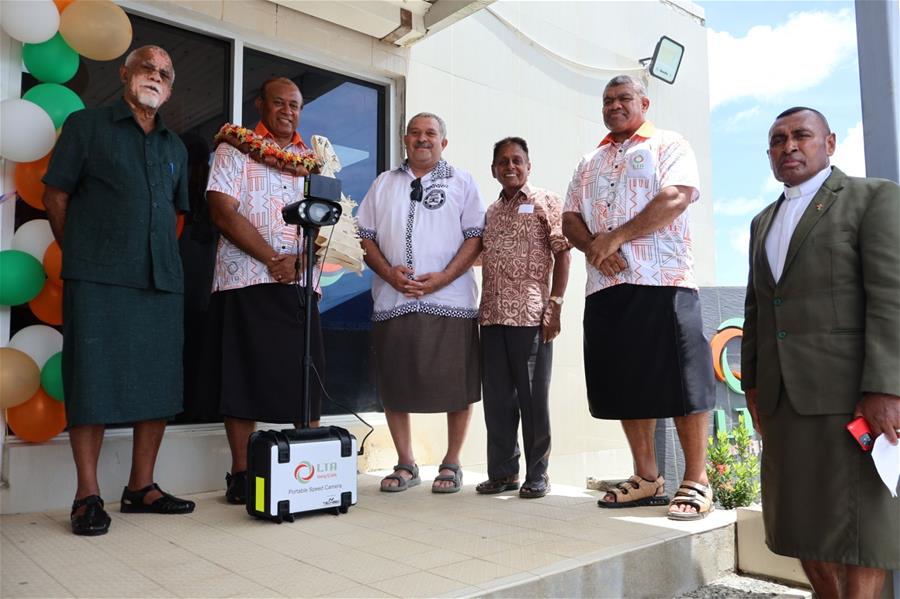SUVA, Fiji (5th September 2025): The Land Transport Authority (LTA) will begin rolling out portable speed cameras across the country from tomorrow, as part of its intensified efforts to address one of the major causes of road fatalities – speeding and reckless driving behaviours.
The commissioning of the nationwide deployment of portable speed cameras was officiated by Minister for Public Works, Meteorological Services and Transport, Honourable Ro Filipe Tuisawau, in February this year.
Hon. Tuisawau emphasized the Government’s commitment to strengthened road safety, noting that the speed cameras, both portable and fixed, were part of an overarching national strategy to enforce traffic laws and address the alarmingly high number of speeding-related deaths on Fijian roads.
Following the completion of the verification and calibration process of the portable speed cameras with the Department of National Trade, Measurement and Standards, as well as training for enforcement officers, LTA Chief Executive Officer Irimaia Rokosawa said 12 portable speed cameras would be deployed in all three divisions from tomorrow.
He said four cameras would be deployed in the Central Division, five in the Western Division, and three in the Northern Division.
“These cameras will be placed at random locations to ensure that drivers are deterred from speeding at all times and in all areas, not just at fixed or pre-announced camera spots,” he said.
“Portable speed cameras differ from traditional fixed cameras in that they can be deployed at any location and at any time of day or night. Operations are not restricted to specific hours.
“The cameras will be used 24 hours a day, seven days a week, including weekends and public holidays. They can be deployed during both peak and off-peak hours, and will also be utilised at night to provide continuous coverage.”
Mr Rokosawa said the initiative formed a critical part of the Authority’s enforcement strategy to save lives on Fiji’s roads.
He says portable speed cameras were designed to keep drivers alert and accountable, no matter where they are driving.
“These cameras will serve as a constant reminder that traffic laws must be followed at all times. A split-second decision to drive beyond the speed limit can change lives forever. That is why we are introducing this flexible and robust tool to strengthen our enforcement capabilities,” Mr Rokosawa said.
He said Fiji was grappling with an increase in road fatalities compared to last year, with the national road death toll as of 4th September 2025 currently at 43, compared to 39 for the same period last year.
Of the 43 fatalities so far this year, the CEO said 26 were directly attributed to speeding, while other contributing factors included careless driving, improper overtaking, pedestrians at fault, and other dangerous driving behaviours.
“Each fatality represents a life lost and a family left devastated. Speeding continues to be the single greatest contributor to road deaths in Fiji. By deploying portable speed cameras, we are directly addressing this issue in a way that will encourage drivers to be responsible at all times, not just when they suspect a camera may be nearby,” Mr Rokosawa added.
“The cameras are not designed to punish, but to save lives by shaping positive driving habits and deterring reckless behaviour. Too often, we see drivers slowing down only when they approach known camera locations, before resuming dangerous speeds once they have passed.
“Portable cameras eliminate that mindset. Drivers will now have to make responsible choices consistently, because these cameras can be anywhere, anytime.”
Mr Rokosawa said the Authority would work closely with the Fiji Police Force in planning and co-ordinating deployment of the cameras to ensure maximum coverage of high-risk and high-traffic areas across all divisions.
He reiterated that road safety was a shared responsibility.
“Enforcement is one part of the equation, but we also continue to drive home the message of education and awareness. We urge all road users – drivers, passengers, and pedestrians – to take responsibility for their safety and the safety of others. Every life matters, and every decision on the road counts,” Mr Rokosawa emphasised.
